To ensure compliance as an NYC commercial contractor, start by understanding building codes and obtaining necessary permits. Keep your licensing updated and follow safety regulations, including regular training for your team. Implement thorough documentation procedures to maintain records of contracts and inspections. Foster clear communication among your staff to minimize misunderstandings and enhance project management. Stay informed about regulatory changes by joining professional organizations and attending workshops. Regularly review and update safety protocols according to OSHA guidelines. Each of these tips can help your projects run smoothly, preventing potential setbacks and penalties, and there's even more valuable insight ahead.
Understand NYC Building Codes
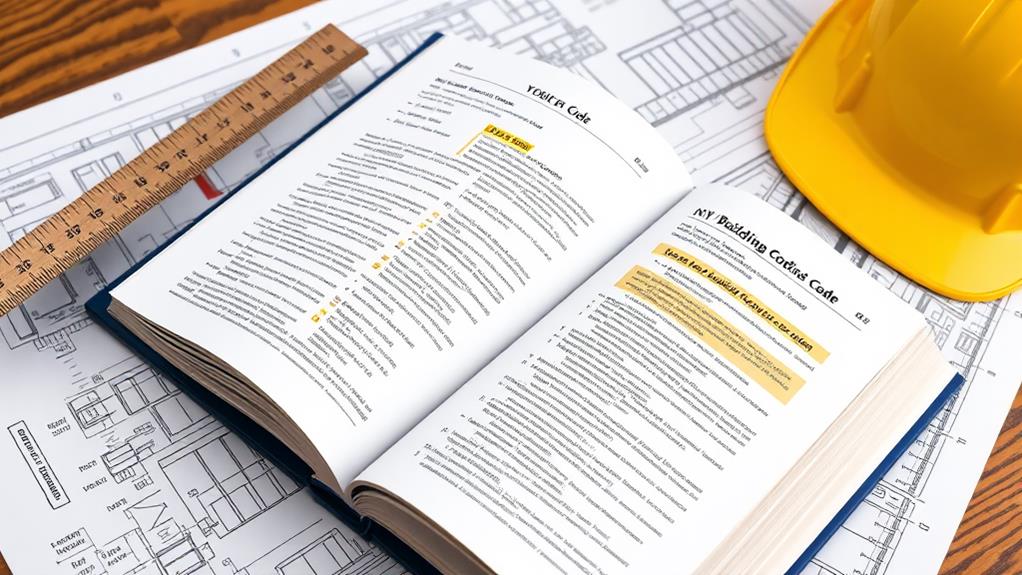
Understanding NYC building codes is crucial for any contractor working in the city. These codes, governed by the New York City Construction Codes, ensure safety, structural integrity, and energy efficiency in all construction projects.
As a commercial contractor known for innovation and quality, you must understand NYC building codes to complete your projects successfully. Every project requires building permits, which means you'll need to submit detailed plans to the NYC Department of Buildings for approval. This process helps ensure your work meets all local regulations.
The NYC Department of Buildings conducts regular inspections to enforce compliance with building codes. If you fail to adhere to these codes, you might face fines or even work stoppages, which can delay your project significantly.
Staying informed about amendments to the building codes is essential, as changes can directly affect your compliance obligations and project requirements.
In the construction industry, being proactive about understanding NYC building codes not only keeps your projects on track but also protects your reputation as a reliable contractor. By prioritizing compliance, you position yourself for success in New York City's competitive construction landscape.
Maintain Proper Licensing
Successfully navigating NYC building codes sets the stage for another vital aspect of your operations: maintaining proper licensing. As a commercial construction contractor, you need to ensure you're properly licensed to work in New York. While most contractors don't require a state-level license, specific trades like asbestos removal, crane operation, and elevator contracting do need to be licensed by the New York Department of Labor.
Additionally, it's crucial to stay updated on commercial construction solutions that can aid in meeting compliance standards.
It's essential to check local regulations in your county or city, as they may impose additional licensing requirements. In New York City, for example, home improvement contractors must apply through the Department of Consumer and Worker Protection (DCWP). You'll need to submit documents like a sales tax ID and proof of residency.
Different counties have unique licensing rules; Suffolk County requires licenses for home improvement contractors and master electricians/plumbers, whereas Nassau County has a $600 application fee and needs a list of subcontractors.
Operating without the necessary contractor license can lead to severe penalties, including loss of payment rights and civil penalties. Therefore, stay informed and compliant with all licensing laws to protect your small business and ensure smooth operations.
Implement Safety Protocols
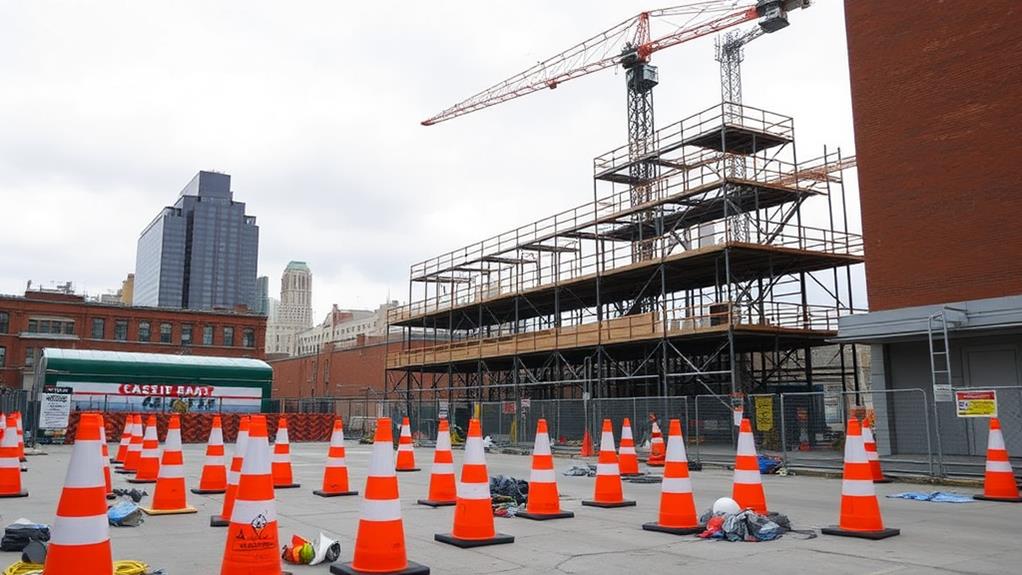
Implementing robust safety protocols is crucial for any commercial contractor in NYC, especially given the city's dynamic construction landscape. These measures not only protect your workers but also ensure compliance with local regulations, preventing costly fines. A commitment to excellence and innovation in safety practices can set your projects apart.
Consider the following essential tips for effective safety management:
- Conduct regular safety training sessions to keep everyone informed.
- Utilize personal protective equipment (PPE) like helmets and gloves to minimize risks.
- Review and update safety protocols regularly to stay aligned with industry standards.
By adopting a comprehensive safety program that meets OSHA standards, you can significantly reduce workplace accidents on your construction site. Make sure all workers are trained on the latest safety protocols and emergency procedures, as required by the NYC Department of Buildings.
Providing appropriate PPE is essential; failure to do so can lead to serious penalties. Additionally, maintain clear documentation of safety inspections and incidents. This not only helps in ensuring compliance but also fosters accountability among your team members.
Ensure Proper Documentation
Proper documentation is the backbone of compliance for commercial contractors in NYC. As a contractor, you must maintain a comprehensive filing system for all contracts, permits, and correspondence. This organization ensures you can easily access important documents during inspections or audits.
Regularly updating and backing up your critical documentation using digital tools is essential to prevent data loss. This way, you'll have all necessary information ready when you need it.
It's also crucial to keep records of safety inspections, incident reports, and training sessions to demonstrate your adherence to OSHA regulations. This not only enhances accountability but also protects your business in case of disputes.
Documenting communication with stakeholders and clients meticulously creates transparency and serves as a reference point for any issues that may arise.
Moreover, ensure all required licenses and permits are prominently displayed on-site. This visibility allows regulatory bodies to review them easily, helping you avoid penalties for non-compliance.
Foster Clear Communication
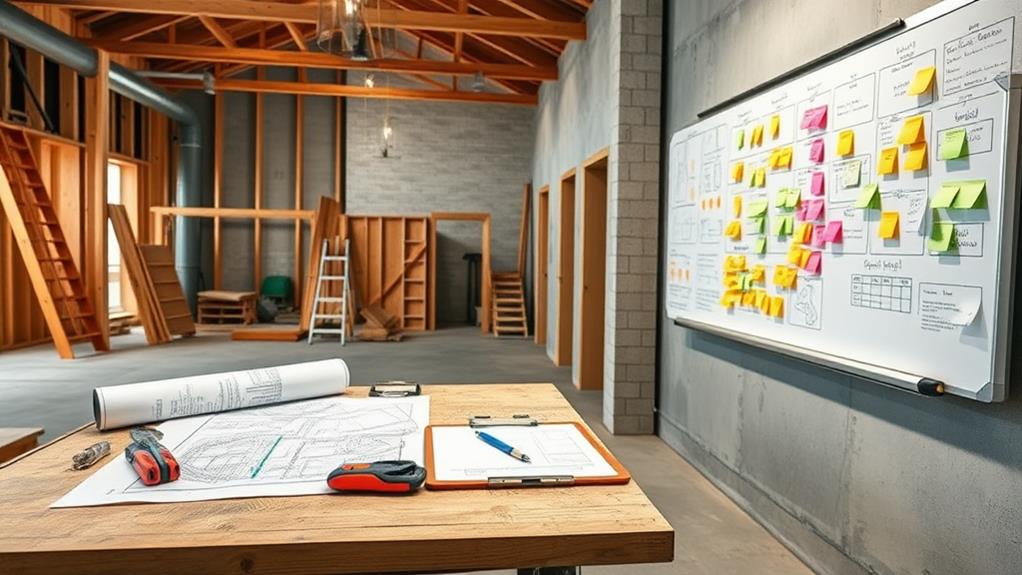
To navigate the complexities of commercial contracting in NYC, fostering clear communication among your team and stakeholders is essential. When everyone understands their roles and responsibilities, you're more likely to have a successful construction project. Here are some key practices to consider:
- Establish clear communication protocols for updates and changes.
- Utilize project management tools for real-time collaboration.
- Document all communications and decisions made throughout the project.
Begin by setting up communication protocols that keep everyone informed about project updates, timelines, and changes. This fosters transparency and accountability.
Using digital project management tools can enhance collaboration and minimize misunderstandings, allowing for seamless communication among team members.
Regular progress meetings are also crucial. These meetings help address concerns, discuss milestones, and ensure everyone is aligned. Encourage open dialogue where team members feel comfortable sharing their thoughts or suggestions. This openness often leads to proactive solutions and improved outcomes.
Conduct Regular Training
Conducting regular training is vital for keeping your team informed about the latest safety regulations and compliance requirements in NYC's construction industry. By providing ongoing training, you ensure that your employees are aware of essential topics like fall prevention, equipment handling, and emergency procedures. This not only minimizes risks but also fosters a culture of safety on your job sites.
In New York City, it's mandatory for all employees to undergo sexual harassment prevention training annually to comply with state laws. Make sure your training sessions cover this requirement. You must also document each session, including the dates, topics discussed, and employee attendance, to demonstrate compliance during inspections or audits.
Additionally, consider offering continuous professional development opportunities for your employees. This keeps them updated on changing laws, codes, and best practices in the commercial construction sector.
Stay Updated on Regulations
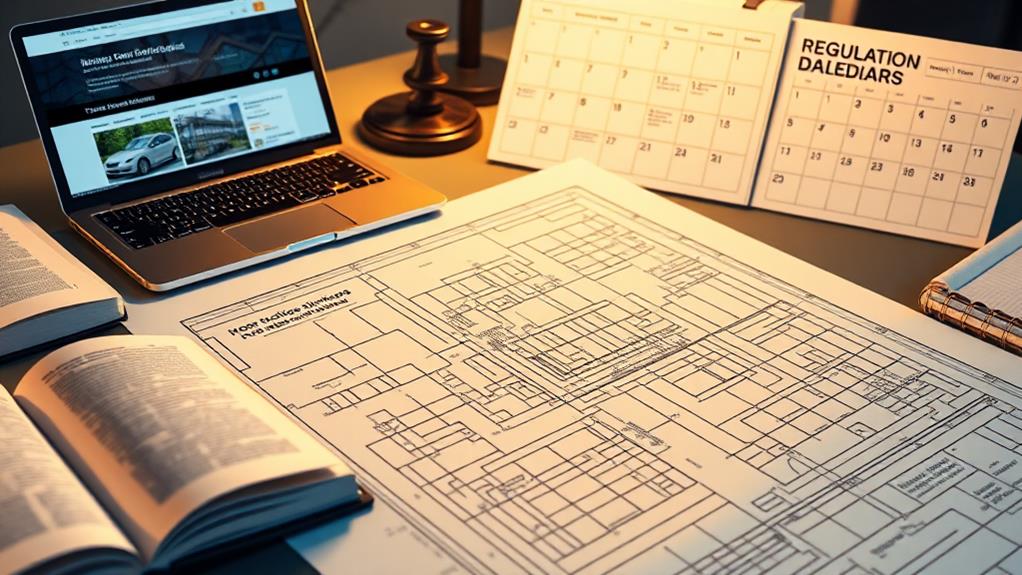
Staying current with regulations is essential for NYC commercial contractors navigating the complex construction landscape. To maintain compliance and ensure smooth project execution, you need to actively seek out information. Here are a few effective ways to stay updated:
- Regularly check the NYC Department of Buildings website for updates on local building codes and construction regulations.
- Attend workshops and seminars hosted by industry organizations to learn about safety regulations and best practices.
- Subscribe to newsletters from the NYC Department of Environmental Protection for timely updates on environmental regulations.
In New York, construction regulations can change frequently, making it crucial for you as a contractor to be informed.
Utilize resources from the New York State Department of Labor to understand labor laws specific to the industry.
Joining professional associations can also provide you with valuable information on regulatory changes and compliance resources.
Conclusion
In conclusion, navigating NYC's commercial contracting landscape is like building a sturdy bridge; it requires careful planning, strong foundations, and constant upkeep. By understanding building codes, maintaining licenses, and implementing safety protocols, you can ensure compliance and success in your projects. Keep the lines of communication open, provide regular training, and stay updated on regulations to avoid any unexpected pitfalls. With these strategies in place, you'll be well-equipped to handle the challenges of the construction industry.

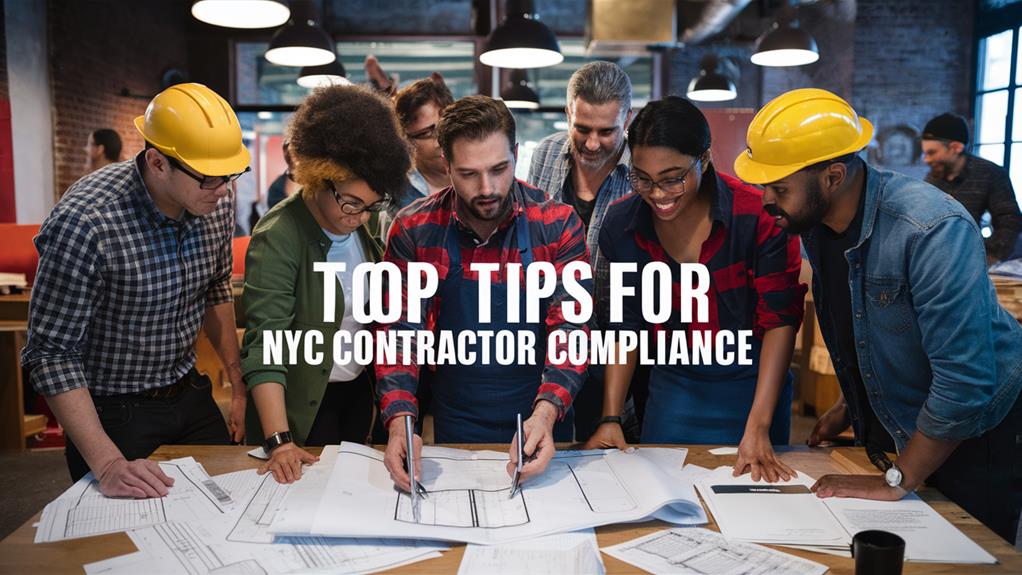
Leave a Reply